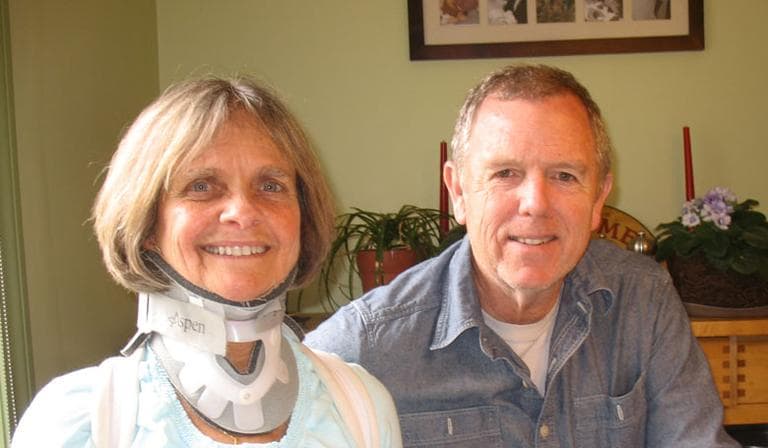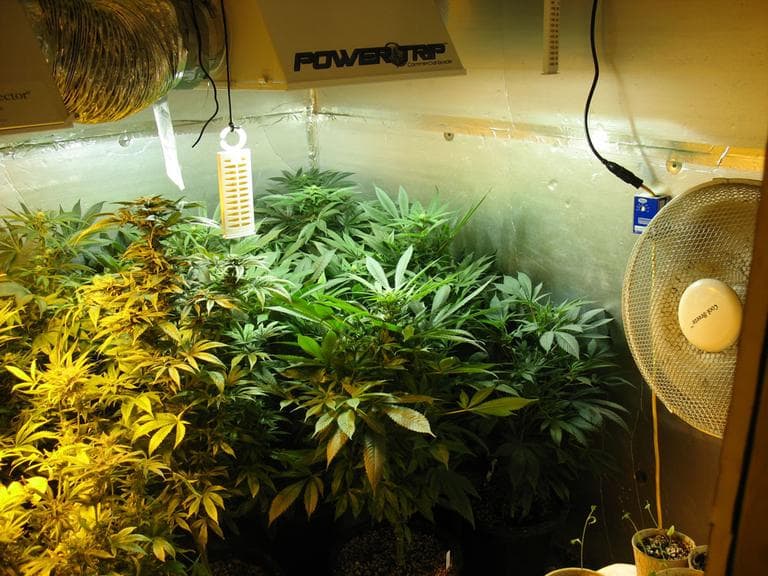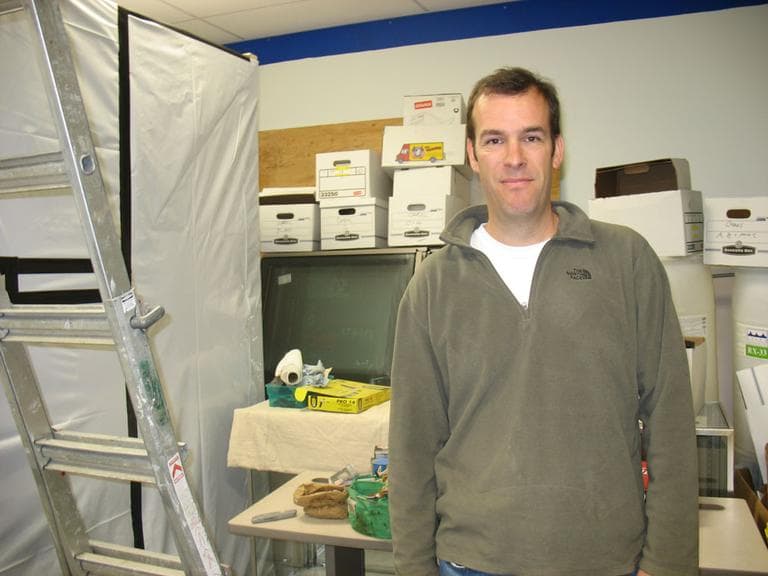Advertisement
R.I. Medical Marijuana Program Still Faces Hurdles
ResumeVoters in Massachusetts may get to decide by ballot question this November whether to legalize medical marijuana. It's already legal in Vermont, Maine and Rhode Island.
But in Rhode Island there is continuing controversy over the law.
In that state, we met 62-year-old Ellen Lenox Smith of North Scituate. She's one of more than 4,500 Rhode Island residents with state-issued medical marijuana cards.
Living With Pain
"I don't think I know what life is like without pain," Ellen says. "I live with it all the time."

Short and thin, Ellen weighs just over 100 pounds and is wearing braces on her upper back and neck.
She suffers from Ehlers-Danlos, a rare disease that makes her collagen defective and in turn weakens her ligaments and tendons.
As she describes, "they're like over-stretched elastic bands," which eventually snap and fail to hold her bones in place. She's had 20 surgeries to stabilize them, some of those operations involving tendons transplanted from cadavers.
With a doctor's approval, Ellen manages her chronic pain with marijuana, which she grows, legally, at home.
Ellen and her husband were both so amazed at how marijuana helped Ellen manage her pain and sleep better that they decided to become state-authorized "caregivers." That means each of them can grow marijuana for up to five other patients.
Ellen and Stuart cultivate marijuana plants at various stages of growth inside three big, well-lit cabinets in their basement.
The marijuana plants inside a small room they built in their basement are about 3 feet tall and are maintained with a system of fans, lights and a dehumidifier. They require daily labor.

I ask Ellen and Stuart if they feel uncomfortable about growing, or in Ellen's case, using, a drug that for most of the population is illegal.
"This is keeping me alive, so I don't have any guilt trip here," Ellen says. "And we became instant advocates for it. I mean, I was scared to try it. I'm not going to lie to you. I hated it in college. I didn't like the feeling of being stoned. I don't get stoned as a patient. I get pain relief only."
"Once you see what the drug does for people, and then you see what other drugs do to people, medicinal marijuana is so benign relative to Oxycontin, Percocet, all these other things," Stuart says.
Dispensaries On Hold
Those who can't grow, or don't want to grow marijuana themselves might eventually turn to a dispensary, or "compassion center" as they're called in Rhode Island — if the three centers authorized by state law get the final go-ahead.
The problem? U.S. Attorney for Rhode Island Peter Neronha has a big issue with those operations.
"I have some real concerns, in a state where I believe there is an appetite for drugs, illegal drugs, that the use of marijuana here could really explode," Neronha says.
And Neronha has the authority to shut down compassion centers and prosecute those involved. That's because although medical marijuana is legal on the state level, under federal law it's not.
"The concern is not with individual patients and their individual caregivers," Neronha says. "What the department does have concerns about are large, commercial grows of marijuana that are done for profit."
Red Tape
Last year, Rhode Island Gov. Lincoln Chafee, who supports medical marijuana, stopped the centers from opening out of concern over what steps Neronha might take.

So now, Rhode Island lawmakers are working on a compromise amendment they hope will appease the federal government by further restricting the number of marijuana plants each center can grow — centers like the one Seth Bock plans to open.
Bock, who's an acupuncturist with a master's degree in herbal medicine, won a state permit to open the Greenleaf Compassionate Care Center in a Portsmouth, R.I., industrial park. He insists — no matter how many plants he'll be allowed to grow there — it will be a nonprofit, as state law requires.
Bock says he'll have to weigh the chance of being arrested by the feds against his desire to help patients.
"I have a long history of working intimately with people that have benefited from this," Bock says. "You know, I'm not a pothead. I'm not interested in the marijuana culture. That's just not my thing."
Medicine, Not Pot
Back in North Scituate, Ellen and Stuart Smith grow an organic garden, sell eggs from their free-range chickens to Whole Foods and have no plans to stop growing medical marijuana.
Ellen has a half dozen jars filled with pot — which she never calls pot, only medicine. And like many other patients, she says she does not smoke it. Rather, she heats some of hers with olive oil, strains it, and then swallows it about a tablespoon at a time.
We've met the real people that need [medical marijuana], and they have a right to dignity and quality of life and this is giving it to them.
Ellen Smith
"This is a night-time sleeping medication for me," Ellen says, "and I have found ingesting it this way, getting it into my system, it carries me through most of the day."
And though she's seen news accounts of some registered caregivers and patients selling marijuana illicitly, Ellen insists that no one other than patients has ever come to her or her husband asking to buy the drug.
"We want to try to continue to keep this program as clean as we can and eliminate those people that are abusing it, because that's not what it's here for," Ellen says. "We've met the real people that need this, and they have a right to dignity and quality of life, and this is giving it to them."
Mass. Ballot Initiative
The U.S. attorney and Rhode Island State Police tell us they have made some arrests of people involved in the program, as have local police in Rhode Island. Rhode Island does not keep statistics tracking those arrests.
Massachusetts Attorney General Martha Coakley's office has certified the medical marijuana ballot initiative here in Massachusetts. Backers now have to gather about 11,000 signatures to get it on the November ballot. Coakley is not taking a public position on the issue.
This program aired on May 7, 2012.